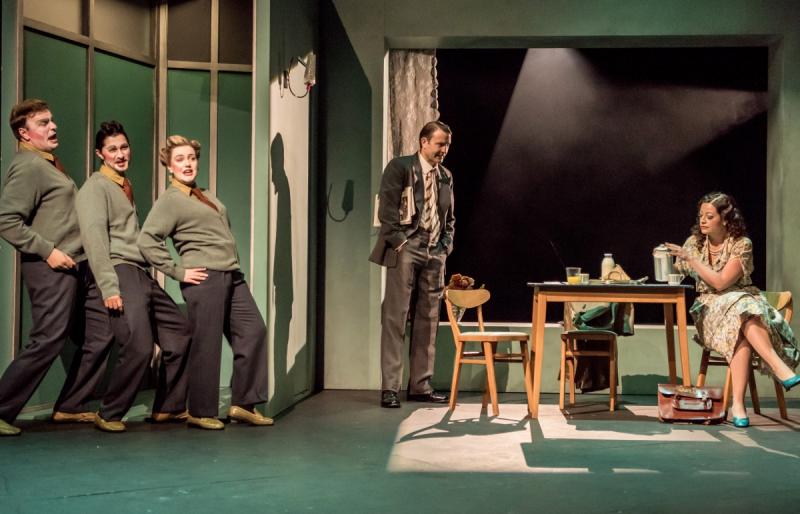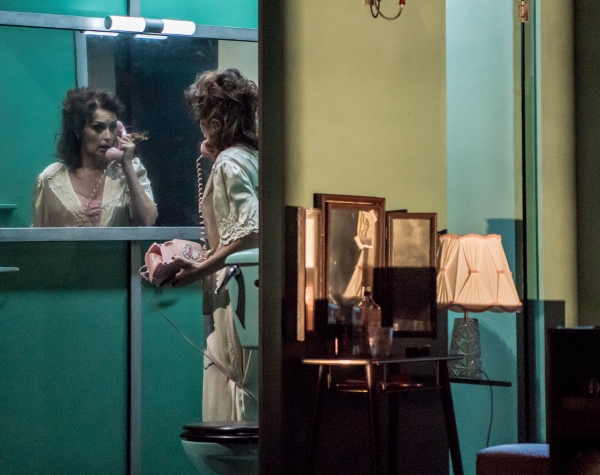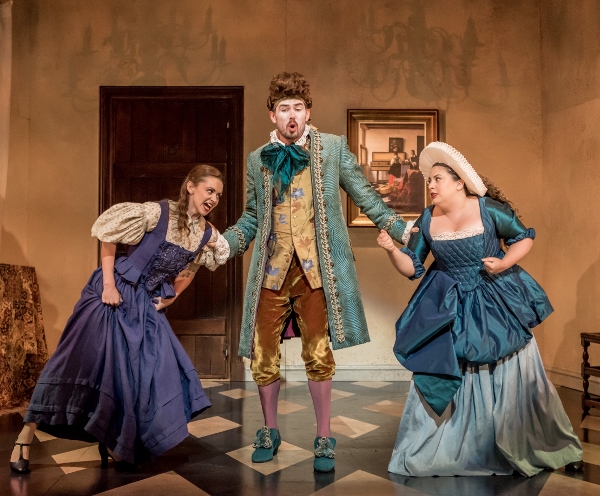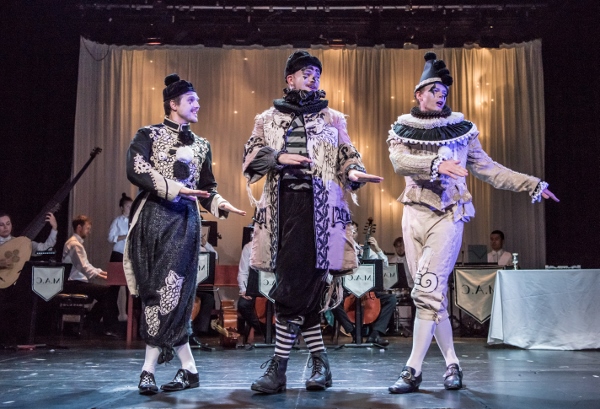Buxton International Festival 2025 review - a lavish offering of smaller-scale work | reviews, news & interviews
Buxton International Festival 2025 review - a lavish offering of smaller-scale work
Buxton International Festival 2025 review - a lavish offering of smaller-scale work
Allison Cook stands out in a fascinating integrated double bill of Bernstein and Poulenc

The Buxton International Festival this year was lavish in its smaller-scale productions in addition to Ambroise Thomas’s Hamlet, the heavyweight offer of the opera programme. And outstanding among them was the combination of Bernstein’s Trouble in Tahiti and Poulenc’s La Voix Humaine: seen by director Daisy Evans not just as a double bill with an overlapping need for telephones on set, but as two sides of the same story.
She took Bernstein’s picture of an American middle-aged couple whose marriage is on the rocks, and Poulenc’s of a woman on the verge of committing suicide after her lover dumped her, and made each a mirror image of the background to the other. So the woman with whom Sam (the husband in Trouble in Tahiti) is having an affair was seen with him in her bedroom through a side-stage window, and in La Voix Humaine the entire set was re-configured to show her apartment from the inside, with Sam appearing both in her dreams and also through the window as the ex-lover (his wife also engaging in the repeated – and repeatedly interrupted – phone calls) in their loveless matrimonial home.
Loren Elstein’s design, following the concept visually, created a set that retained its shape but reversed its content: the two locations of the first opera being exactly exchanged (and seen from different angles) to become those of the second.
The loveless couple of Trouble in Tahiti were Charles Rice as Sam and Hanna Hipp as Dinah, with the scat-singing trio (Chloé Hare-Jones, Harun Tekin and Ross Cumming) interacting both with them and later with Elle (the protagonist of La Voix Humaine) and her lost love. In a strong delineated and sung characterization, Bernstein’s lovely A Quiet Place song was Hanna Hipp’s most moving moment, and Charles Rice made the self-regarding, macho adulterer Sam very much his own, particularly in There are men. The stand-out of the evening, though, was Allison Cook as Elle in La Voix Humaine (pictured above). The one-woman one-act opera, based on Cocteau’s monodrama of 1930 and initially created with him as collaborator, is often a vehicle for a virtuosic and gifted dramatic soprano – here it became also a moving and tragic experience, both because of her gifts and because of the ingenious way in which it was paired with Trouble in Tahiti. Also appearing in the festival as Gertrude in Ambroise Thomas’s Hamlet, her soprano Falcon, with dramatic power over a very wide range, from coloratura at the top to a passionate chest voice, and acting ability made the solo role tragically moving, the climax of the evening. Iwan Davies conducted a large orchestra for both pieces, which was evidence of the remarkable vocal resources she brought to it.
The stand-out of the evening, though, was Allison Cook as Elle in La Voix Humaine (pictured above). The one-woman one-act opera, based on Cocteau’s monodrama of 1930 and initially created with him as collaborator, is often a vehicle for a virtuosic and gifted dramatic soprano – here it became also a moving and tragic experience, both because of her gifts and because of the ingenious way in which it was paired with Trouble in Tahiti. Also appearing in the festival as Gertrude in Ambroise Thomas’s Hamlet, her soprano Falcon, with dramatic power over a very wide range, from coloratura at the top to a passionate chest voice, and acting ability made the solo role tragically moving, the climax of the evening. Iwan Davies conducted a large orchestra for both pieces, which was evidence of the remarkable vocal resources she brought to it.
Also seen at Buxton Opera House, the only real comedy among the festival operas was The Impresario, an adaptation by Christopher Gillett (who also directed) of Mozart’s Der Schauspieldirektor – first made for Opera Zuid in Holland in 2023. (The original, heard in 1786 at the Schönbrunn Palace outside Vienna at the behest of Joseph II, was written to be in competition with an Italian opera by Salieri, both performed at the same time in the same room. “Too many notes” indeed).
Describing the trials and tribulations of putting on an opera, the Gottlieb Stephanie penned scenario had much dialogue and not many notes: there’s an overture, a solo aria for each of two would-be prima donnas, and two ensembles: one a trio for the two women who both insist “Ich bin die erste Sängerin” to the hapless assistant director, and a finale for everyone.
In Gillett’s version, excerpts from some of Mozart’s other works are added, and the story is somewhat embellished as we see a rehearsal of a show which is itself about putting on a show, and characters can ease from one role to another to their “real” selves at any point.
The speaking role of the fading impresario was played by the actor Richard McCabe, with seven singers. Nazran Fikret and RNCM-trained Jane Burnell (the vocal star of the show, ending the first half with a beautiful "Deh vieni non tardar" from The Marriage of Figaro) were the two would-be prima donnas; Dan D’Souza (also in the festival’s Hamlet opera this year) was the impresario’s assistant and sang "Non più andrai"; Conor Prendiville was Monsieur Vogelsang, a character who seemed more and more to be like Mozart himself, trying to reconcile the singers’ warring egos (pictured below); Jamie McDougall had a cameo role near the end as a mad Scottish opera director, and Owain Rowlands and Jessica Hopkins briefly appeared as Papageno and Papagena in the well-known duet from The Magic Flute. Quality singing and plenty of fun, then, and Iwan Davies conducted the festival’s own orchestra to excellent effect. Two programmes in the festival were given in the Pavilion Arts Centre, adjoining Buxton Opera House. It lends itself to work that needs no elaborate set and can accommodate orchestral resources on a level with the singers, and was imaginatively used by designer Elliott Squire for four new mini-operas given as a single programme called Shorts. Each had its own creator(s), director and cast (and including a small chorus when needed) and lasted about 25 minutes, representing a commendable commitment by the BIF to promoting new work. To describe all four in any detail would be tedious: my own best liking was for the two first heard, in particular Carmel Smickersgill’s Inevitable (with libretto by Josh Overton), with its three-strong cast of Beca Davies, Christopher Cull and Julia Mariko, which shows a kind of end-of-the-world stopwatch that seems to presage the extinction of everything and which can only be reversed through costly determination – a parable of the dilemma of global warming, I guess. The music is fundamentally tonal, often simple in texture and almost neo-baroque in construction, masterfully made.
Two programmes in the festival were given in the Pavilion Arts Centre, adjoining Buxton Opera House. It lends itself to work that needs no elaborate set and can accommodate orchestral resources on a level with the singers, and was imaginatively used by designer Elliott Squire for four new mini-operas given as a single programme called Shorts. Each had its own creator(s), director and cast (and including a small chorus when needed) and lasted about 25 minutes, representing a commendable commitment by the BIF to promoting new work. To describe all four in any detail would be tedious: my own best liking was for the two first heard, in particular Carmel Smickersgill’s Inevitable (with libretto by Josh Overton), with its three-strong cast of Beca Davies, Christopher Cull and Julia Mariko, which shows a kind of end-of-the-world stopwatch that seems to presage the extinction of everything and which can only be reversed through costly determination – a parable of the dilemma of global warming, I guess. The music is fundamentally tonal, often simple in texture and almost neo-baroque in construction, masterfully made.
Life Gets Stretched, by Martin Green to his own libretto, is a thing of itself: a ballad-like, heartstring-tugging story of a couple (Themba Mvula and Alexandra Meier) who sing completely in a non-language while a narrator tells their story. It raises a range of questions about the workings of opera itself, and formed a tangential reflection on the problems of Sam and Dinah in Trouble in Tahiti, as it happened.
 The festival’s only imported production, and only piece of authentic baroque performance, was of Charpentier’s La descente d’Orphée aux enfers, given by Jonathan Darbourne and Betty Makharinsky’s Vache Baroque company, with dance contribution from BirdGang Ltd. It was impeccable in its musical performance qualities and given a twist of modernity by the dance element introduced to the familiar plotline, with the “shades” of the underworld seen as (it seemed) all-monochrome Pierrots (pictured above). The only disappointment is that in Charpentier’s version, Orphée and Euridice get back to life without problems (Pluto having spotted that his wife Persephone seems to fancy Orphée, which gives him a good reason for letting the two of them go). They exit in turn... and we’re left wondering, What Happened Next...?
The festival’s only imported production, and only piece of authentic baroque performance, was of Charpentier’s La descente d’Orphée aux enfers, given by Jonathan Darbourne and Betty Makharinsky’s Vache Baroque company, with dance contribution from BirdGang Ltd. It was impeccable in its musical performance qualities and given a twist of modernity by the dance element introduced to the familiar plotline, with the “shades” of the underworld seen as (it seemed) all-monochrome Pierrots (pictured above). The only disappointment is that in Charpentier’s version, Orphée and Euridice get back to life without problems (Pluto having spotted that his wife Persephone seems to fancy Orphée, which gives him a good reason for letting the two of them go). They exit in turn... and we’re left wondering, What Happened Next...?
- Further performance of The Impresario tonight; the double bill of Trouble in Tahiti and La Voix Humaine is to be given at Norwich Theatre Royal on September 2 and 3
- More opera reviews on theartsdesk
rating
Share this article
The future of Arts Journalism
You can stop theartsdesk.com closing!
We urgently need financing to survive. Our fundraising drive has thus far raised £49,000 but we need to reach £100,000 or we will be forced to close. Please contribute here: https://gofund.me/c3f6033d
And if you can forward this information to anyone who might assist, we’d be grateful.

Subscribe to theartsdesk.com
Thank you for continuing to read our work on theartsdesk.com. For unlimited access to every article in its entirety, including our archive of more than 15,000 pieces, we're asking for £5 per month or £40 per year. We feel it's a very good deal, and hope you do too.
To take a subscription now simply click here.
And if you're looking for that extra gift for a friend or family member, why not treat them to a theartsdesk.com gift subscription?
more Opera
 BBC Proms: The Marriage of Figaro, Glyndebourne Festival review - merriment and menace
Strong Proms transfer for a robust and affecting show
BBC Proms: The Marriage of Figaro, Glyndebourne Festival review - merriment and menace
Strong Proms transfer for a robust and affecting show
 BBC Proms: Suor Angelica, LSO, Pappano review - earthly passion, heavenly grief
A Sister to remember blesses Puccini's convent tragedy
BBC Proms: Suor Angelica, LSO, Pappano review - earthly passion, heavenly grief
A Sister to remember blesses Puccini's convent tragedy
 Orpheus and Eurydice, Opera Queensland/SCO, Edinburgh International Festival 2025 review - dazzling, but distracting
Eye-popping acrobatics don’t always assist in Gluck’s quest for operatic truth
Orpheus and Eurydice, Opera Queensland/SCO, Edinburgh International Festival 2025 review - dazzling, but distracting
Eye-popping acrobatics don’t always assist in Gluck’s quest for operatic truth
 MARS, Irish National Opera review - silly space oddity with fun stretches
Cast, orchestra and production give Jennifer Walshe’s bold collage their all
MARS, Irish National Opera review - silly space oddity with fun stretches
Cast, orchestra and production give Jennifer Walshe’s bold collage their all
 Káťa Kabanová, Glyndebourne review - emotional concentration in a salle modulable
Janáček superbly done through or in spite of the symbolism
Káťa Kabanová, Glyndebourne review - emotional concentration in a salle modulable
Janáček superbly done through or in spite of the symbolism
 Buxton International Festival 2025 review - a lavish offering of smaller-scale work
Allison Cook stands out in a fascinating integrated double bill of Bernstein and Poulenc
Buxton International Festival 2025 review - a lavish offering of smaller-scale work
Allison Cook stands out in a fascinating integrated double bill of Bernstein and Poulenc
 Tosca, Clonter Opera review - beauty and integrity in miniature
Happy surprises and a convincing interpretation of Puccini for today
Tosca, Clonter Opera review - beauty and integrity in miniature
Happy surprises and a convincing interpretation of Puccini for today
 Hamlet, Buxton International Festival review - how to re-imagine re-imagined Shakespeare
Music comes first in very 19th century, very Romantic, very French operatic creation
Hamlet, Buxton International Festival review - how to re-imagine re-imagined Shakespeare
Music comes first in very 19th century, very Romantic, very French operatic creation
 Falstaff, Glyndebourne review - knockabout and nostalgia in postwar Windsor
A fat knight to remember, and snappy stagecraft, overcome some tedious waits
Falstaff, Glyndebourne review - knockabout and nostalgia in postwar Windsor
A fat knight to remember, and snappy stagecraft, overcome some tedious waits
 Salome, LSO, Pappano, Barbican review - a partnership in a million
Asmik Grigorian is vocal perfection in league with a great conductor and orchestra
Salome, LSO, Pappano, Barbican review - a partnership in a million
Asmik Grigorian is vocal perfection in league with a great conductor and orchestra
 Semele, Royal Opera review - unholy smoke
Style comes and goes in a justifiably dark treatment of Handelian myth
Semele, Royal Opera review - unholy smoke
Style comes and goes in a justifiably dark treatment of Handelian myth
 Le nozze di Figaro, Glyndebourne review - perceptive humanity in period setting
Mostly glorious cast, sharp ideas, fussy conducting
Le nozze di Figaro, Glyndebourne review - perceptive humanity in period setting
Mostly glorious cast, sharp ideas, fussy conducting

Add comment